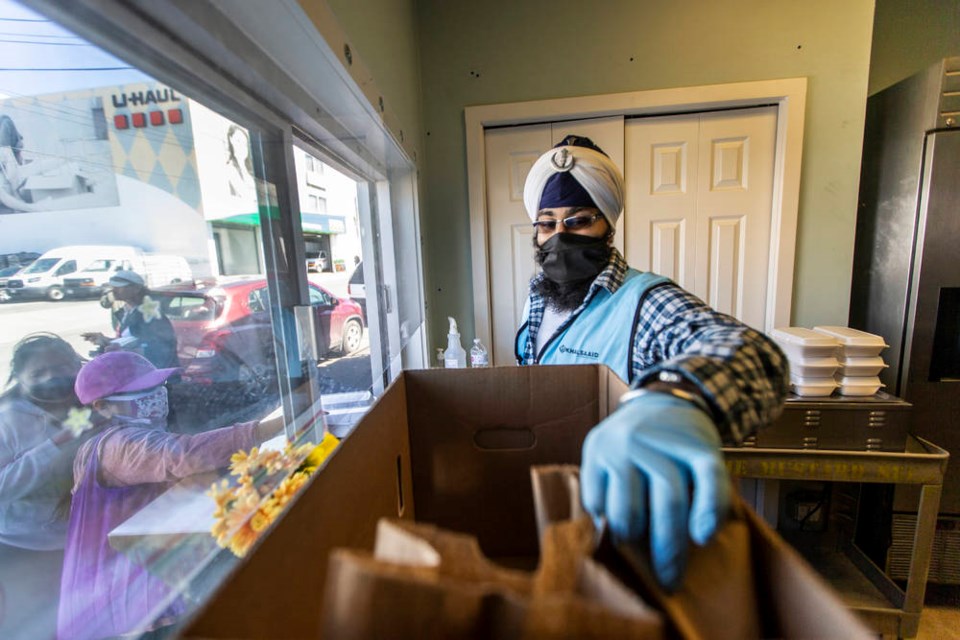Outside the Mustard Seed Street Church, Petar Zivkovic rolls his mobility scooter up to a table and plucks a Ziploc care package from the pile: toothbrush, toothpaste, socks, chocolate bar, bandages…
“It’s very helpful,” the 81-year-old says. He doesn’t have a lot of money for such things. “When you live on $1,165, and your rent is $1,200, it’s not easy.”
So he was grateful for the bag of basics, as well as for the lunch that was also provided by Khalsa Aid Canada on Tuesday — a Sikh non-profit feeding the disadvantaged at a Christian street church.
Tuesday was Vaisakhi, and April is Sikh Heritage Month, which is why a handful of young volunteers from the Victoria chapter of Khalsa Aid were inside the Mustard Seed, filling takeaway containers with midday meals for the long line of people who stretched down Queens Avenue. Plenty of others from the group wanted to pitch in, too, but COVID protocols limited the numbers on site.
That’s one thing about the pandemic, says Khalsa Aid’s Peter Gill. It has given people a chance to live the values of Vaisakhi. It has provided an opportunity to demonstrate gratitude, to share, to recognize the equality of people and work to their benefit. “The essence of Vaisakhi is what we’re doing today,” he says.
It’s not as though the relationship between the Mustard Seed and the Victoria branch of the Sikh group is a once-a-year thing, though.
“Right from the start of the pandemic, they were looking for ways to get involved,” says the street church’s Rev. Chris Pollock. When COVID suddenly sent vulnerable people tumbling onto the pavement, homeless, it was Khalsa Aid that showed up at the Mustard Seed with tents and sleeping bags.
Since March 2020 the group’s efforts have been largely pandemic-related.
“Within Victoria we’ve been extremely busy over the past year,” says national director Jindi Singh. He was one of those who founded Khalsa Aid as an international humanitarian organization in the U.K. in 1999. Today there are 15 Canadian branches from Port Alberni to Halifax.
Working with B.C.’s 211 help line, the group has provided groceries to people isolated by COVID quarantines, or who have simply felt too vulnerable to go outside on their own. Through the Victoria Immigrant and Refugee Centre, it has also provided culturally appropriate food to 200 families who came here from around the world.
Drawing on a Victoria volunteer base of 100, Khalsa Aid has also provided meals to local first responders and sent aid to food banks. (“What we found during the pandemic was a lot families who had never been to a food bank and suddenly had to go,” Singh says, echoing a reality heard all too often from those who work at ground level.)
The group has funnelled help to the Victoria Women’s Transition House and the 1Up Single Parent Resource Centre. It bought four televisions for the young people the Threshold Housing Society brings off the streets. On Tuesday, leftover packs of hygiene items were taken to Our Place.
Before the pandemic, the volunteers also provided monthly meals to Our Place — Indian food prepared in the kitchens of local gurdwaras. On Tuesday, though, the takeaway lunch at the Mustard Seed consisted of pizza, apples, granola bars, bottled water and some sweet treats. It was the sort of fare the people who get lunch from the street church have grown to expect.
Why does Khalsa Aid do all this? It’s rooted in the Sikh belief in equality and unity. “All humanity is one,” Singh says. “Our faith tells us not to distinguish.”
Oh, if we all could really live that way. It was the great promise when the internet age arrived: Having the world at our fingers was supposed to draw us together. Instead, all too often it just made it easy to find a silo in which to hunker down.
Look at the way we consume information. Instead of a diversity of voices, we opt for echo chambers, sources that confirm our biases and limit our experiences. No unconsidered perspectives, no unexpected opinions to shape our views. In consequence, we lose our glue, see only what sets us apart, yell at each other on social media. The stress of the pandemic hasn’t helped.
So, when someone seizes that pandemic as an opportunity to go in the other direction, it feeds the soul.
jknox@timescolonist.com



